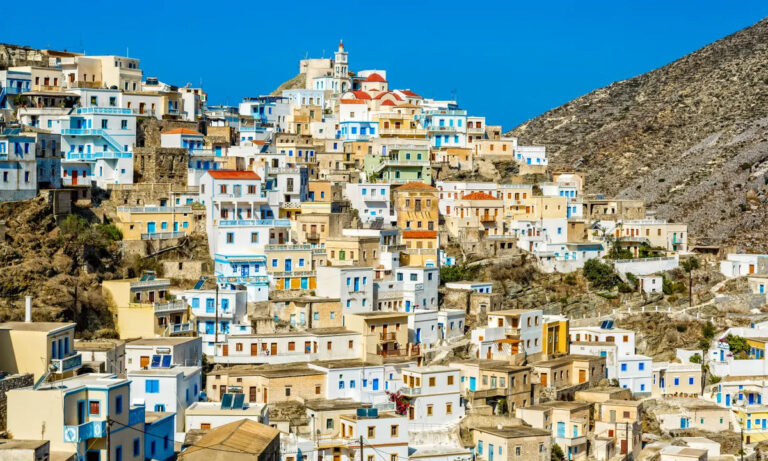“Dad, it’s the song you always hum!” As my child shouted excitedly, a familiar melody rang in my ears.
On the TV screen, Greek singer Theodora Baka was singing the Greek folk song “The Children of Piraeus.”
“So much I’ve tried, I’ve never found a port to captivate my heart as Piraeus does,” sang Baka.
At that moment, I had a flashback to the memories of the Port of Piraeus. The song “The Children of Piraeus” was written by Greek composer Manos Hatzidakis. It conveys the optimistic and open-minded attitude of the Greek people. In 1960, it gained worldwide acclaim when Greek actress Melina Mercouri performed it in the film “Never on Sunday,” and won the Academy Award for Best Original Song in the same year.
The first time I heard “The Children of Piraeus” was at a reception held by the Chinese Embassy in Greece in 2014. Its catchy and melodious chorus made me hum along. As a newcomer, I quickly memorized the melody.
Facing the Aegean Sea, Greece is the cradle of Western civilization. The ancient Greek culture, like a dazzling star, shines brightly in the long river of human history. Represented by epics, dramas, and philosophy, the classical culture of ancient Greece, nurtured and enriched by the Aegean Sea, has yielded fruitful intellectual achievements and become the source of Western civilization.
However, Greece in the early 21st century was plagued by various problems such as the debt crisis, a high unemployment rate, and a stagnant economy. In 2010, China’s COSCO Shipping acquired and successfully operated the No.2 and No.3 container terminals of the Piraeus, bringing significant economic and social benefits. It was regarded by the locals as a business model.
In 2016, COSCO Shipping acquired a 67 percent stake in the port authority and officially took over in August. I was also transferred to work at the Port of Piraeus, and got to see with my own eyes the picturesque scenes depicted in the song “The Children of Piraeus” with the sound of birds chirping and young people joyfully singing and dancing.
However, it was much more challenging to truly integrate into the Port of Piraeus than just learning a song. As a management executive, my first challenge was institutional reform and personnel adjustments.
In October 2016, I was responsible for selecting department leaders for the new structure. Among the interviewees was a woman surnamed Vassiliou, who was then the general manager of the labor department at the Port of Piraeus. She had extensive experience in human resources, and her confidence was evident on her face, making the atmosphere a bit tense at the beginning.
Suddenly, Vassiliou’s phone rang with the ringtone “The Children of Piraeus.” This little incident made her somewhat embarrassed. I smiled and said in English, ” ‘The Children of Piraeus’ is a great song, very touching.” She was surprised that I knew this song.
The song suddenly broke the ice between us, and the conversation flowed easily. Vassiliou said that this song was her favorite, just like the Port of Piraeus, where she had worked for most of her life. She also expressed some disappointment about the changes happening there.
In response to her honesty, I said, “You and my parents are close in age, and I am deeply honored and humbled to meet you. The Chinese company’s acquisition of the Port of Piraeus aims to collaborate with Greek colleagues for mutual benefit, improving the port’s facilities and services, and enhancing its competitiveness in the global market. The Port of Piraeus needs constant renewal, but it will always be the Port of Piraeus in your heart.”
The sincere beginning paves the way for a wonderful ending. After thorough communication, Vassiliou accepted the arrangement and became a department advisor as she wished. She left us with her affirmation and blessings, saying, “You are a management team worth expectation. I hope our cooperation will make the Port of Piraeus better and better.”
One year later, on her retirement day, she specifically came to bid me farewell, saying that she always remembered the little incident during the interview, our honest communication, and the constant renewal of the Port of Piraeus.
Under the management of COSCO Shipping, the container throughput of the Piraeus has increased from 880,000 twenty-foot equivalent units (TEUs) in 2010 to over 4 million TEUs in 2017, making it the fastest-growing port in container throughput worldwide. This remarkable growth led to a significant improvement in economic benefits and the Port of Piraeus has been highly praised by both the Chinese and Greek governments.
In the pleasant sunshine in June 2017, the Port of Piraeus and Shanghai Port signed a sister port agreement, further strengthening the connectivity between the Piraeus port and Chinese ports. Tassos Vamvakidis, a Greek employee, applauded the moment.
Vamvakidis has been working in shipping since 1973 and has witnessed the rise, fall, and revival of the Port of Piraeus. In an article titled “The Children of Piraeus,” he recounted his observations, feelings, and thoughts during the seven to eight years since he joined the container terminal of the Port of Piraeus managed by COSCO Shipping in 2009.
Vamvakidis once saw the predicament of the port in 2010. He could feel the fundamental change in local people’s attitude when Greeks often give a thumb-up to COSCO Shipping employees with oriental faces.
In his opinion, this change came from the Chinese company’s commitment to transformation while maintaining localization: only six or seven executives were sent from China, while the rest of the managers and employees were all Greeks. This decision quickly provided thousands of new direct job opportunities for the locals and indirectly employed tens of thousands of people.
Through sincere cooperation between employees from both countries, the Port of Piraeus has gradually become a modern, reliable, and highly productive port, gaining an increasingly higher reputation in the industry and effectively supporting the development of the local business community.
Vamvakidis, upon invitation, attended the inaugural Belt and Road Forum for International Cooperation and took the stage on China Central Television’s show “The Reader.” After reciting his story to the Chinese audience, Vamvakidis sincerely said to the camera, “I am proud to be a member of the COSCO Shipping family. As a ‘Child of Piraeus’ and a shining pearl in the Mediterranean Sea, the Port of Piraeus will continue to create new benefits and hopes for the Greek people, and renew the chapter of friendship, cooperation and development between Greece and China.”
In the summer of 2019, my family and I traveled to Switzerland. While staying at a local hotel, a familiar melody started playing. It was “The Children of Piraeus.”
I couldn’t help but hum along, and noticed the eager gaze of the hotel receptionist. After some talks, I learned that he was a native of Piraeus and had come to Switzerland for work due to employment difficulties back home.
“You’re from China, and do you know a Chinese company called COSCO Shipping? They’re doing great in the Port of Piraeus, and I have friends working there,” he asked me.
I replied that I was actually working for COSCO Shipping in Piraeus, making development plans for the port and promoting the cruise and other industries. I told him that in the future, surrounding tourism facilities such as hotels, duty-free shops, and malls would embrace significant development, and perhaps in a few years, he would return to his hometown and find a job of his choice.
In Greek, Piraeus means “the place over the passage,” and it once withstood frequent invasions from foreign naval forces. Today, the Port of Piraeus is opening its arms to welcome visitors and fully loaded container ships from all directions. The song “The Children of Piraeus” and the China-Greece cooperation on the Port of Piraeus are reflections of the profound friendship between the two countries. Today, under the Belt and Road Initiative, Piraeus has once again become a shining pearl in the Mediterranean Sea.
“The Children of Piraeus” is a song that symbolizes the Port of Piraeus. Most importantly, it is a witness to the exchange, mutual learning, and win-win cooperation between China and Greece.
Source: Hellenic Shipping News







